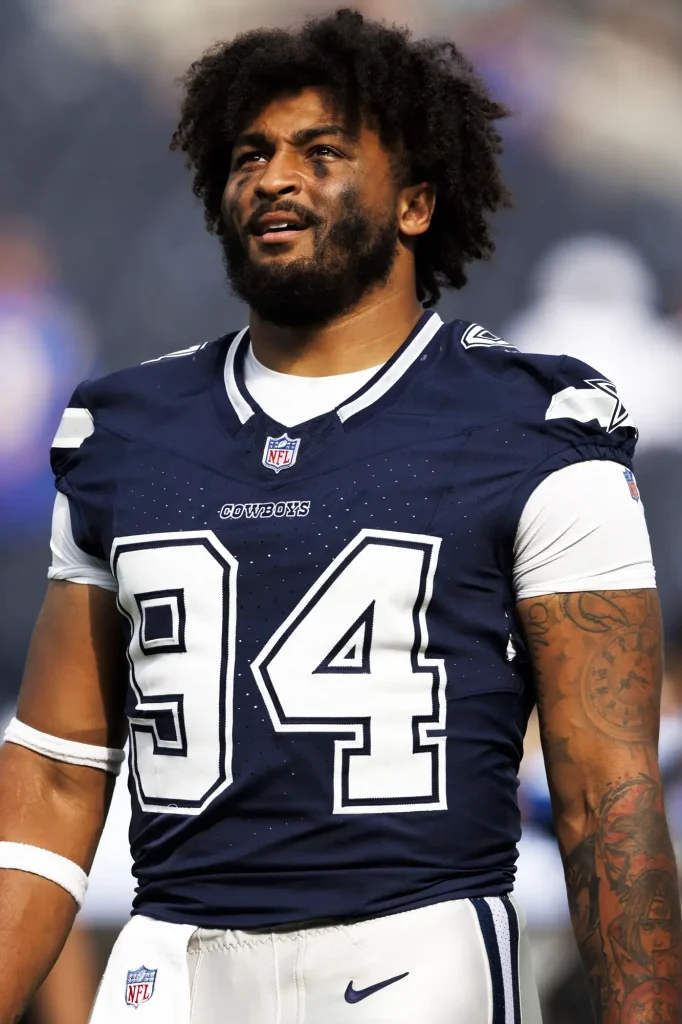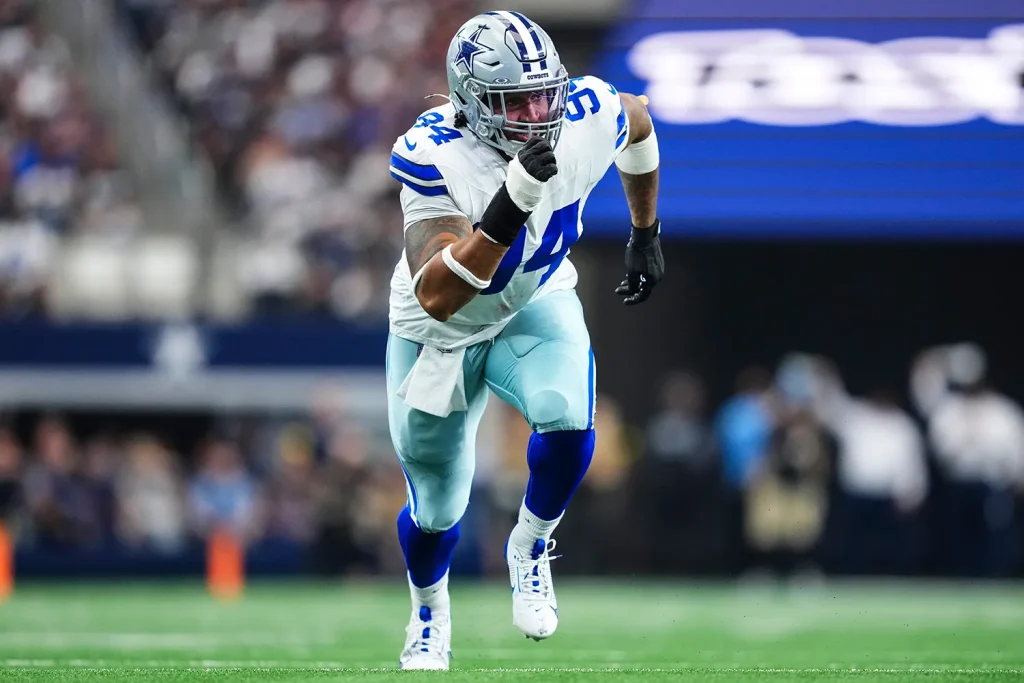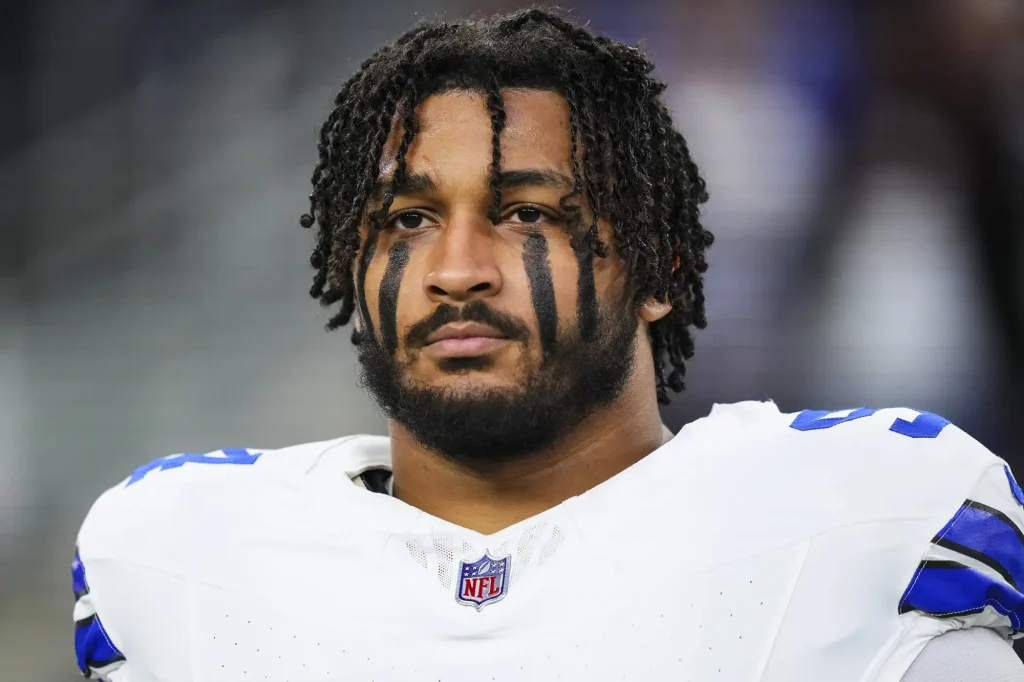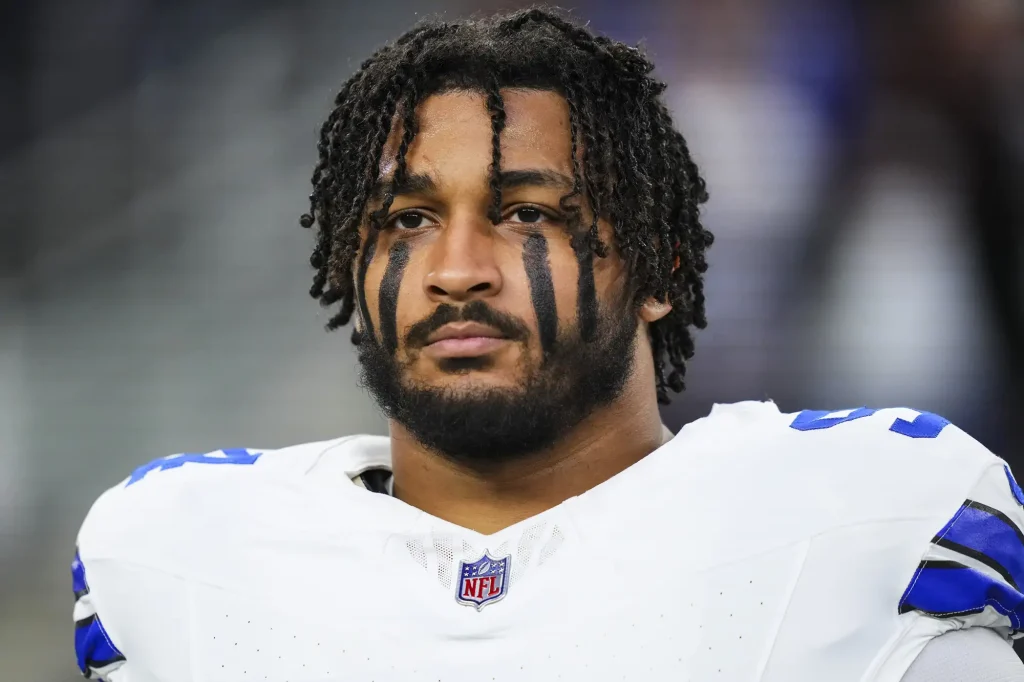Dallas Cowboys Player Marshawn Kneeland’s Girlfriend Called Police Fearing He Was Armed and Suicidal — Heartbreaking Dispatch Audio Exposes His Final Hours
In the early hours of Thursday morning, the Dallas Cowboys announced that defensive end Marshawn Kneeland had passed away at just 24 years old. The team’s statement reflected the profound grief and shock felt throughout the locker room, the league and beyond: “It is with extreme sadness that the Dallas Cowboys share that Marshawn Kneeland tragically passed away this morning. Marshawn was a beloved teammate and member of our organization. Our thoughts and prayers regarding Marshawn are with his girlfriend Catalina and his family.”

What began as an uplifting moment in his second NFL season quickly unraveled into one of the sport’s most heartbreaking stories in recent memory. Only days prior, Kneeland had made headlines when he recovered a blocked punt for a touchdown in a Monday Night Football game versus the Arizona Cardinals—an emotional highpoint that seemingly came too close to tragedy.
Kneeland’s journey to the NFL was one of resilience and promise. A native of Grand Rapids, Michigan, he starred at Godwin Heights High School before playing at Western Michigan University from 2019 to 2023. There he became a Second-Team All-MAC selection in 2023 and amassed noteworthy production as a defensive lineman.
Selected 56th overall by the Cowboys in the 2024 NFL Draft, Kneeland entered the league with high hopes. In his two seasons with the team, he appeared in 18 games, made 26 tackles, recorded one sack, and recovered one fumble. While his role had not yet blossomed into stardom, his work ethic, energy and upbeat presence garnered respect from coaches, teammates and the front office.
To his inner circle, Kneeland was more than just an athlete. His mother’s death in February 2024 had cut deeply; he carried her ashes in a pendant, honoring her memory as he pursued his dream of reaching—and playing in—the NFL.
The sequence of events leading to Kneeland’s death is still being pieced together, but public records and dispatch audio offer a chilling snapshot. On Wednesday night, around 10:30 p.m., troopers with the Texas Department of Public Safety attempted to pull over a vehicle driven by Kneeland for a traffic violation on the Dallas North Tollway near Keller Springs. The vehicle failed to stop, and a short pursuit ensued before officers lost sight of it.

Minutes later, the vehicle was discovered abandoned at a crash site on the southbound Dallas Parkway. The driver had fled on foot. Meanwhile, dispatch audio obtained by media outlets revealed that Kneeland’s girlfriend had called authorities, reporting her belief that Kneeland was armed, had a history of mental-health concerns, and was at risk of “ending it all.” “He is armed,” the dispatcher relayed. “We’re talking to the girlfriend, she’s trying to call the agent … she is saying he has a history of mental illness … ‘He will end it all.’”
Hours later, at approximately 1:30 a.m., the Frisco police located Kneeland’s body in a portable toilet at the crash site, apparently from a self-inflicted gunshot wound, per the department’s statement. The official cause of death remains under investigation by the Collin County medical examiner’s office.
Impacted by her boyfriend’s rapidly worsening state, Kneeland’s girlfriend, identified only as Catalina, joins a list of loved ones now left grappling with unimaginable pain. The Cowboys and the broader NFL community have extended support but have also asked for privacy during a time of raw grief.
Locker rooms across the league fell silent upon hearing the news. For the Cowboys, the ripples extend far beyond wins and losses. Defensive linemen, coaches and even new additions to the roster spoke of Kneeland’s presence—how he studied tape, kept a grin in the locker room, and was working to elevate his game week-by-week. Former college coaches remarked how his leadership went beyond the stat sheet, how he embraced younger teammates and poured his heart into every practice.

In a statement, Kneeland’s agent, Jonathan Perzley, wrote: “I watched him fight his way from a hopeful kid at Western Michigan with a dream to being a respected professional for the Dallas Cowboys. Marshawn poured his heart into every snap, every practice and every moment on the field. To lose someone with his talent, spirit and goodness is a pain I can hardly put into words.”
While the league and team await final autopsy results, what remains unequivocal is that Kneeland’s death raises stark questions about mental-health resources, warning signs and athlete support systems. Dispatch audio revealed that she—his girlfriend—contacted authorities about potential harm, and yet the tragedy could not be averted. That fact alone sparks uncomfortable but necessary discussion.
Kneeland’s case joins a sobering list of young athletes who have died by suicide or under circumstances involving mental-health crises. These incidents serve as stark reminders that elite status and fame do not shield individuals from emotional pain or internal battles. For the NFL, it’s a call to intensify efforts around mental-health awareness, to strengthen support networks for players, to ensure access to timely counseling—and to foster an environment where asking for help is not a sign of weakness but a marker of strength.
On Monday night, Kneeland lived a dream few ever achieve: he scored his first career NFL touchdown when he recovered a blocked punt against the Arizona Cardinals. Players, coaches and fans celebrated the moment—just days later, the football community confronted its worst nightmare. The juxtaposition of triumph and tragedy underscores the fragility of life, even when everything appears to be moving in the right direction.
In his short time, he traded the promise of a college standout for the reality of an NFL locker room, stepping into a league of intense competition and media scrutiny. To teammates, he was more than a name on a roster—he was a teammate, a friend, a young man with big dreams and a toothy smile.
As questions remain—about the full timeline, the details of the chase, the mental-health factors, the cause of death—what this moment demands is reflection rather than speculation. For the Cowboys, for the league, for fans and for every player walking into a stadium this weekend, this is a moment to pause and remember someone who dreamed, who fought, who got his shot and whose time was far too short.
In the grief-filled silence of an empty locker room, Kneeland’s voice lingers in the memories of those who knew him—a humble young man who arrived at training camp with wide eyes, a soft laugh, and an unwavering focus on getting better. He had room to grow, to shine even brighter. Instead, he is gone, leaving behind unanswered questions, a stunned team and a community mourning a life that mattered.
With his name now etched forever in the annals of Dallas Cowboys history, Marshawn Kneeland’s legacy will not be defined by the tragic final hours, but by the journey he took and the impact he made in a short time. He came into the league hungry, honored his roots, embraced the grind and lived his dream on the field. Off the field, he leaves behind loved ones, teammates and coaches whose lives were touched by his spirit.
Though his career was just beginning, his loss reverberates far beyond the statistics and game day highlights. It serves as a grave reminder that every athlete is a person first—and that mental-health struggles do not always manifest in headlines until they manifest in heartbreak.
For everyone who cheered him on, his life offers one overriding message: love your people, speak your truth, seek help when the weight becomes too heavy. Marshawn’s light burned bright and briefly, and while it’s extinguished now, his memory demands we carry the torch forward—through compassion, understanding and action.
If you or someone you know is struggling with thoughts of self-harm or suicide, confidential help is available in the U.S. by calling or texting 988, or via chat at 988lifeline.org. International resources can be found via www.iasp.info/suicidalthoughts.


